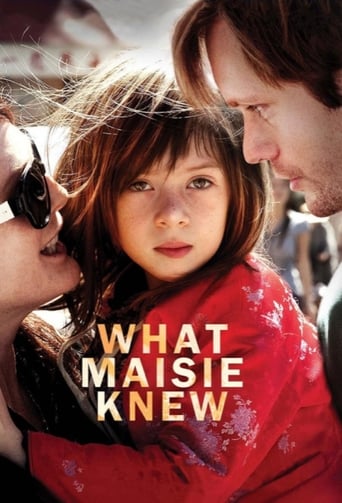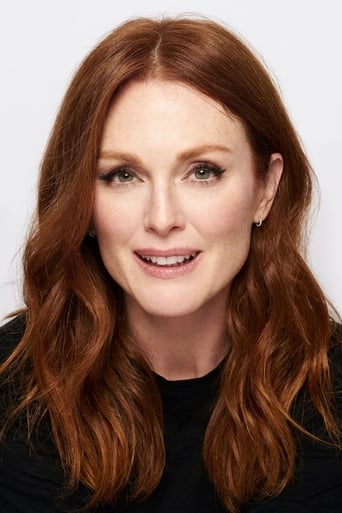What Maisie Knew (2013)
The story frames on 7-year-old Maisie, caught in a custody battle between her mother – a rock and roll icon – and her father. What Maisie Knew is an evocative portrayal of the chaos of adult life seen entirely from a child’s point of view.
Watch Trailer
Cast


Reviews
Excellent modernization of the Henry James novel of 1897 by the same title. Julianne Moore delivers her usual spot-on narcissist. Steve Coogan does same with equal aplomb. Alexander Skarsgard is excellent as Lincoln. He plays to Onata Aprile's remarkably authentic acting naturally. I was amazed. Joanna Vanderham as Margo is good, but less convincing as kid-loving governess and stepmother. The fact that James' work translates so well into the upper class of this time is stunning. Child as trophy, as projection screen, as puppet. The basic assertion of the story is simple. A child will recognize love and gravitate to it, despite the conventions of society or manipulation of dysfunctional birth parents. This story reflect James' insights into human nature, which were partially enlightened by his brilliant brother, William, who was one of the first scientific physician-psychologists in the U.S.. I highly recommend this film.
I hate movies involving kids and animals. I avoid them like the plague because they strike the most sensitive cord in my heart which is the care for the ones who cannot care for themselves.Then again, I cannot turn a blind eye to the ugly reality around me, so I went ahead a watched a movie that I knew would make me hate certain parents. This movie made me feel so, because despite that we may live in a different city or have a different social status, kids are kids whatever the circumstances.I want to start by congratulating every single actor for their incredibly credible performances, and if Julianne Moore or Steve Coogan ever read this review I want to also add a ton of love for the difficult roles they had to play. Onata Aprile (Maisie) was of course incredible.Now I want to start from what I did not like about this movie, which unfortunately I wish it could happen in real life. There are some minor exaggerations and parts where, while probably true in some cases, I can hardly believe it would happen in every separation with kids involved, but what prevented this movie for getting my full marks were the happiest parts. It's like watching a miracle; by definition this is not meant to happen. These parts took me away from the feeling of watching real lives and made me remember that, after all, this is a movie, and what is going to happen is whatever the screenwriters and directors say that is going to happen.And what did happen? Marginal reality, because god forgive that we, the audience, are presented with the 100% true facts of what really goes on in the lives of the children. The movie got it almost right, 90% of the time, and for that I am thankful. And for that I recommend every future parent to watch this movie not thinking themselves as the 10%, as the exception, but as the most likely rule.If you do not have kids but wants them remember to ask yourself if you have enough time, enough patience, and the right partner to conceive a human life that needs these three ingredients. A human life is far too important to leave it to chance, and sometimes just because you happen to have functioning reproductive organs does not mean you should be a parent. Sometimes it is better to deny yourself of that gratification so you can do the right thing, the mature thing.
SPOILERS Of course!I will not rehash the plot of this excellent film. I will only comment on the subjective undercurrent of the story, and at the end pay a little homage to similar great child performances.A critic said that this film has a "happy ending." Unfortunately, I beg to differ.Since the film makers knew that they could not, within the constraints of a 2 hr. movie, show the maturation and aging of Maisie the way James could in a full novel, they (the film makers) chose to end the film on an outwardly superficial and subsequently, a very unsettling ending. Just as within the film, Maisie is viewed almost like a stagnant garden statue that is moved here and there by the whims of its owner, the ending is also one of "false" happiness, and security. a moment in time, or a slice of life fugue that becomes most unsettling, even horrifying when you realize that this idyllic moment is just that, a brief interlude.Soon, Maisie will have to go back to her mother, her father will be almost totally out of the picture, and who knows where Margo and Lincoln will end up because it is painfully obvious that the glue that holds them together is not a true budding love for each other, but an overwhelming love of Maisie and a need to be her saviors. But, in the end, they cannot be, and though we as viewers hope for the typical Hollywood happy ending, it also cannot be. The stoic innocence of Maisie's present will soon be shattered by the realities of adolescence and beyond. The fact that we can foresee the damaged adulthood that lays ahead despite the momentary reprieve is what is so horrific. Like the 1960's film of Shirley Jackson's "The Haunting", the "unseen" is often more horrifying than the usual theatrics of most films of this nature.In closing, I would also like to comment on the affective emotional state of Maisie. I think this subtlety is where the film really stands out. We have been subjected to enough graphic horrors of child abuse, child abandonment, and unfit parents in film. Movies of this nature tend to be terrifying like "Bastard Out of Carolina" or lightly played as in Kramer Vs. Kramer. Maisie is characterized almost as an enigma. We see her for the most part as a receptacle of the unchecked emotions of the grownups that surround her, yet she does not let us into her world, but we "know" what damage to her psyche must be taking place.The most poignant moment in the film (to me) came where Maisie, for one brief moment lets down her emotive guard and while lying in her bed, sheds a single tear. We then "know" what Maisie "knew"It also did not escape me that considering Maisie's almost "frozen" inner emotional state of being, that this momentary realization on her part, was an either intentional, or unintentional homage to that famous scene in the French short film, "La Jetee"Maybe, it was in this moment that Maisie (as the James novel evokes) has a premonition of "the death of her own childhood". Because despite Maisie's false bravado, the film's ending is a but a momentary false hope.The truer narrative is that Maisie, along with Margo and Lincoln will be forced by circumstance to soon confront the transient nature of their beach house fairy-tale, and we as viewers must transition from the world of film to the bleaker future realities of Henry James's novel.This performance by child actor, Onata Aprile, reminded me of another child actress, Ana Torrent, who's wonderful understated acting can be seen in the films: El Espíritu de la Colmena (The Spirit of the Beehive) and Cría Cuervos (Raise Ravens) my personal favorite.Though a totally different style of acting, probably the best performance of a child acting in a film period, was Ann Carter in the 1944 film, "Curse of the Cat People" the Val Lewton masterpiece that could be (and has been use d as such) A textbook of child psychology. The title has nothing to do with this gem of a movie, used only to appease his RKO contract to make a sequel. Lewton wanted to call the film, "Anna and Her Friend"And lets not forget the over the top "stagy" by design, performance of Patty McCormack in the 1956 film, "The Bad Seed" (too bad the Hayes code did not permit the film to end like the book...the movie's only flaw)Finally, one of the most beautiful performance by a child actor was Patricia Gozzi, in the 1962 Best Picture, "Sundays and Cybele" ( Les Dimanches de Ville d'Avray) I cry every time I see this film, now out in BD.
I read, years ago, a comment by a psychologist that the ability to nurture is the highest level of human emotional behaviour for nurturing requires a person to place another's well-being either equal to or above one's own. And this is where some parents fall so short as they may love their child dearly, but are unable to reconcile their wants and needs with those of their children.What Masie knows is that her parents love her, but for various reasons both have a very limited ability, if any, to nurture. In the last scene when Maisie touches her mother's shoulder, Maisie demonstrates what they lack: the capacity to offer comfort and love despite disappointments and limitations in life or in character.







